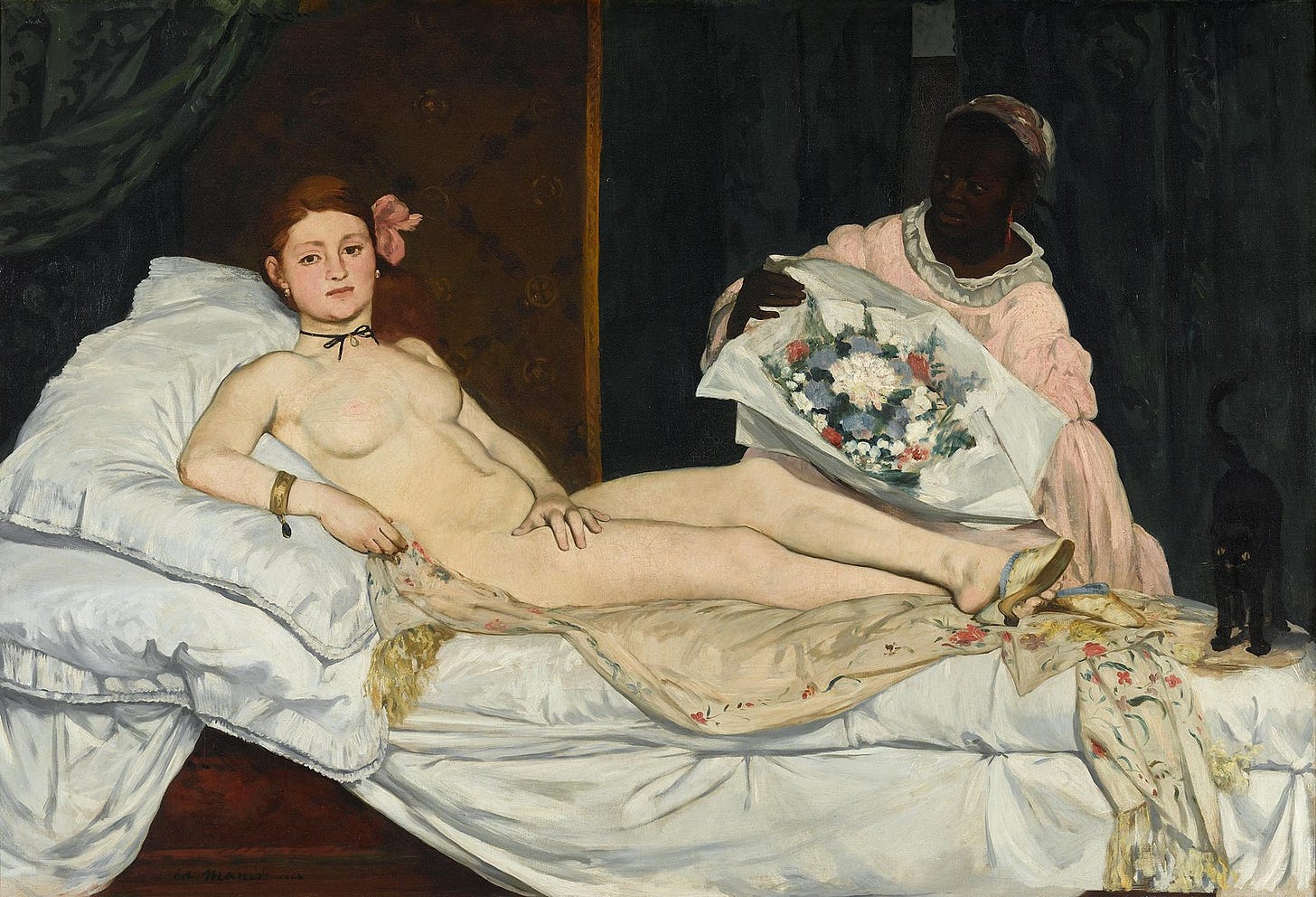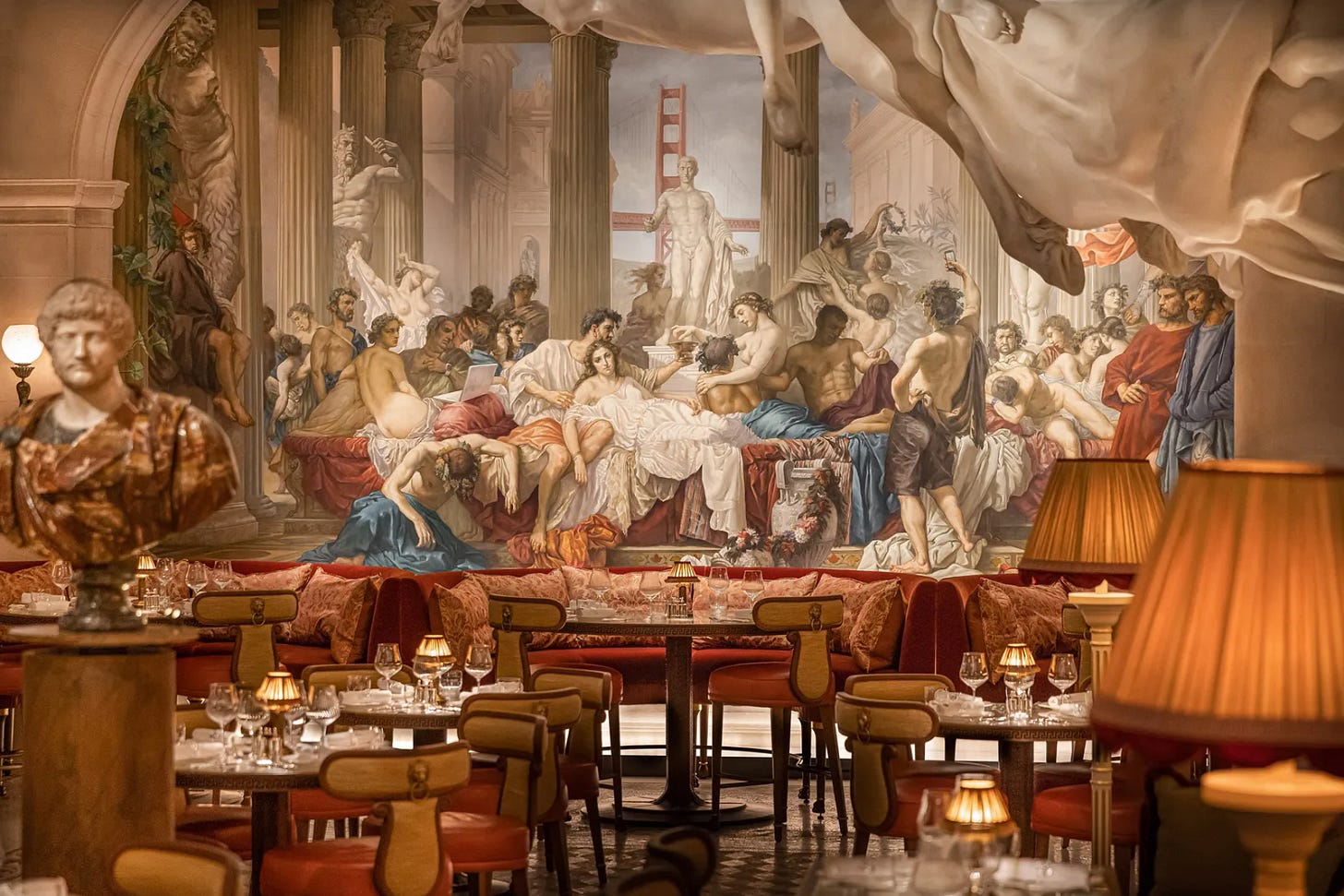Volume 11
Olympia by Édouard Manet— Parasite by Bong Joon-ho — Smoked salmon bagel — Bacchanalia, London — Skincare routine AM
Happy Sunday and welcome to the eleventh edition of Giselle daydreams! Today, I’m writing about one of Edouard Manet’s most famous paintings. I’m also discussing a Korean film that you must watch in Korean, and I’m also sharing how I make a delicious smoked salmon bagel for an indulgent lunch or breakfast. Finally, let’s daydream in one of London most sumptuous restaurant and discover my skincare morning routine to get that glow. Enjoy!
Art
Olympia by Édouard Manet (1863)
I chose to feature Olympia - a groundbreaking and controversial painting. Olympia is a powerful and provocative work that continues to be studied and discussed in the context of art history and gender studies. Manet's audacious approach in depicting the female nude had a profound impact on the trajectory of modern art, influencing subsequent generations of artists who sought to break away from traditional norms and challenge societal expectations. I appreciate that Olympia draws inspiration from classical art, particularly Titian's Venus of Urbino. However, Manet's treatment of the subject is a deliberate departure from the idealised, sensual portrayal of women in classical art. This painting is considered a seminal piece in the transition from Realism to Modernism, challenging traditional artistic conventions and sparking discussions about gender, sexuality, and the role of art.
.Olympia is a painting by the French artist Édouard Manet. Created in 1863, it is considered one of the most iconic and controversial works in the history of art. Olympia challenges the traditional representations of the female nude and stirred significant controversy when it was first exhibited at the Paris Salon in 1865.
At the centre of the composition features a reclining nude woman, Olympia. She lies on a bed with her right arm strategically positioned to cover her genitalia, and her left hand holds a bouquet of flowers. Her nudity is unapologetic and confrontational. Olympia looks directly at the viewer with a bold and assertive gaze. This direct eye contact is a departure from traditional depictions of nude women, who often appeared passive and demure. To the right of Olympia stands a black servant, who presents a bouquet of flowers. The servant's presence introduces questions about race, class, and the dynamics of power within the painting.
Olympia's direct and confrontational gaze challenges the traditional male gaze prevalent in classical depictions of the nude. Her assertive posture disrupts the conventional passive role assigned to the female nude in art. The explicit depiction of a known prostitute as the subject of a major artwork was scandalous at the time. Manet's choice of subject matter was a deliberate departure from the idealised and mythological depictions of the female form. Olympia is often seen as a reinterpretation or response to Titian's Venus of Urbino. While Titian's Venus is a symbol of idealised beauty and sensuality, Manet's Olympia presents a more realistic, modern, and sexually empowered woman. The bouquet of flowers in Olympia's hand is traditionally associated with Venus, the goddess of love. However, in this context, the flowers might carry a dual meaning, serving as a symbol of both desire and a transactional relationship.
Manet's style, often associated with Realism, rejects idealisation and romanticism. He presents a contemporary, unidealised depiction of a woman, challenging the artistic conventions of the time. Olympia's assertive posture and direct gaze are interpreted as a statement of sexual agency. Unlike the passive muses in many traditional nudes, she appears in control of her own sexuality. The presence of the black servant raises issues of race and class. The servant's role as an attendant to the nude woman implies a power dynamic that goes beyond mere servitude.
Olympia was displayed at the Paris Salon in 1865, where it caused a scandal due to its explicit subject matter and departure from traditional artistic norms. Critics and audiences were shocked by Olympia's direct gaze and the implications of her profession as a known prostitute. Manet's painting was met with criticism and accusations of vulgarity. However, it also sparked discussions about the role of art in challenging societal norms and expectations. Manet's defiance of artistic conventions laid the groundwork for the avant-garde movements that followed.
Olympia is considered a pivotal work in the transition from Realism to Impressionism. Manet's innovative approach to composition, color, and subject matter challenged academic conventions and paved the way for modern art movements. The painting is often cited as an early example of Modernism, influencing subsequent generations of artists who sought to break away from established norms.
Olympia remains a significant work in art history, not only for its aesthetic innovations but also for its bold and provocative engagement with societal norms and artistic conventions of the time. Manet deliberately disrupts the idealisation of the female nude. Olympia's body is not portrayed as classically beautiful, and her bold gaze challenges the viewer's expectations of how a female subject should behave in art. Olympia's direct gaze and confident posture convey a sense of sexual agency. Unlike passive figures in traditional nudes, she appears in control of her own sexuality, challenging societal norms regarding the representation of women in art. The painting's impact continues to be felt in discussions about gender, representation, and the evolution of art.
A film
Parasite by Bong Joon-ho (2019)
I was always attracted to watch foreign films, and when I learned about this film a year after its release, I had to watch it. It is a masterpiece on so many levels, from the cinematography to the home aesthetic and the satirical comment on society through deception and manipulation. I was in awe when I first watched it, that I decided to re-watch Parasite again, which I do not usually do so soon after.
Parasite is a critically acclaimed South Korean film directed by Bong Joon-ho. Released in 2019, the film quickly gained international recognition and became a major success, winning numerous awards, including the Palme d'Or at the 2019 Cannes Film Festival and four Academy Awards, including Best Picture, Best Director, Best Original Screenplay, and Best International Feature Film at the 92nd Academy Awards in 2020.
Parasite is a multi-layered film that skillfully weaves together social commentary, satire, and suspense. Through its compelling narrative and well-crafted characters, the movie prompts audiences to reflect on issues of class, identity, and the consequences of societal inequalities.
Parasite revolves around two families from different social classes in South Korea. The impoverished Kim family, struggling to make ends meet, slowly manipulates their way into working for the wealthy Park family. Ki-taek (played by Song Kang-ho) and his family gradually infiltrate the lives of the Parks, securing jobs as tutors, drivers, and housekeepers. As they become more deeply entwined with the lives of the affluent family, unexpected events unfold, leading to a series of shocking and darkly comedic twists that challenge social hierarchies and class divisions.
The film portrays shifting power dynamics as the Kims manipulate and deceive the Parks. However, these dynamics are fluid, and the film challenges the audience's perceptions of who holds the power throughout the narrative.
Parasite critically examines the stark contrast between the wealthy and impoverished in society. It delves into the struggles of the lower class and explores how they navigate a world where opportunities seem limited, highlighting the systemic issues related to social and economic inequality.
Parasite employs symbolism and metaphorical elements to convey its message. The film's title itself serves as a metaphor for the social parasites within the story, exploring the symbiotic relationship between the Kim and Park families and the parasitic nature of social hierarchy.
The film explores the themes of deception and manipulation, showcasing how the Kim family uses their wit and cunning to infiltrate the lives of the Parks. It raises questions about ethics, morality, and the lengths people are willing to go to improve their circumstances. The characters in Parasite engage in various forms of deception to improve their socio-economic status. The Kims assume false identities to secure employment within the Park household. This theme explores how societal expectations and economic pressures can lead individuals to compromise their integrity.
Bong Joon-ho uses the narrative to comment on societal issues such as unemployment, poverty, and the desperation that can lead people to commit morally questionable acts. The film also addresses the disparity between perception and reality, challenging the audience's assumptions about the characters.
Bong Joon-ho also uses satire and dark humor to critique the social and economic structures in South Korea. The film portrays the absurdities and contradictions in the lives of the rich and the poor, highlighting the disparities in opportunities and resources.
Bong Joon-ho, along with cinematographer Hong Kyung-pyo, uses visual elements and symbolism to convey the film's themes. The architectural design of the Park family's modern and luxurious house serves as a metaphor for the socio-economic hierarchy. The physical space reflects the class divisions, with the Kims living in a cramped semi-basement apartment while the Parks reside in an expansive, high-tech mansion. The use of stairs, for example, becomes a recurring motif that represents the characters' ascent or descent in socio-economic status.
Parasite provides a critical examination of capitalism and the pursuit of wealth. It questions the sustainability of a system that perpetuates extreme wealth and poverty and explores the consequences of unchecked economic inequality.
The film's ending is marked by a violent incident that challenges conventional notions of justice. Bong Joon-ho intentionally leaves the conclusion open to interpretation, prompting viewers to reflect on the moral complexities presented throughout the story.
Parasite is celebrated not only for its compelling narrative and powerful themes but also for its sharp social commentary and innovative storytelling. Parasite explores the theme of social class and economic disparity. The film vividly depicts the vast gap between the wealthy Park family and the struggling Kim family. The Kims infiltrate the lives of the Parks by obtaining jobs as their domestic staff, illustrating the harsh realities of class divisions in society. Bong Joon-ho masterfully blends genres, seamlessly incorporating elements of thriller, dark comedy, and drama. The film's pacing, cinematography, and storytelling techniques contribute to its tension-filled atmosphere and keep the audience engaged throughout. It has sparked discussions worldwide about class struggle, economic disparity, and the human condition, making it a significant and impactful contribution to contemporary cinema.
A recipe from a Panzer’s groupie
The famous smoked salmon bagel at home
I am by no means affiliated with St John’s Wood fancy deli shop Panzer’s, but I do some food shopping from them regularly. If you’re from London and you like to do your groceries in upscale venues, you may be familiar with Panzer’s!
They are famous for the lavish fruits and vegetables stall display, the high end quality products they sell from various cuisines, and their bakery. This brings me to what this post is about, making a delicious smoked salmon bagel if you crave one like me!
This recipe is extremely easy and yet so satisfying.
For one bagel you will need:
1 bagel of your choice, sliced and toasted - I like the everything in the bagel, the poppy seed or the sesame bagel instead of the plain bagel
lots of smoked salmon - I would realistically say around 70g
generous amount of cream cheese - I like the Shefa mixed herbs one, but if I were to go for plan cream cheese, I would add some dill on the salmon for extra flavour
a couple of finely sliced cucumber
Method
Toast your bagel.
Spread each side of your bagel with a generous amount of cream cheese, add the smoked salmon on each side, finish by adding the thin slices of cucumber on one side. Close your bagel, and it’s ready to be devoured.
Enjoy!
Eating in London
Bacchanalia
I discovered Bacchanalia on Instagram, and I was immediately intrigued. It was described as London’s most beautiful and expensive restaurant, which made me want to pin to my restaurants wish list. I visited the establishment a few months ago for lunch - at the moment lavish lunches are my treats, as I am still trying to implement an evening routine for Queen L, which is slowly but surely beginning to work!
I do not usually go in-depth when it comes to restaurant names. However, since Covid I developed a sudden interest for Greek, Roman and Egyptian mythology, which lead me to to study two short online courses. The restaurant name epitomises what bacchanalia is all about.
Bacchanalia refers to wild and drunken celebrations or orgies, typically associated with the worship of Bacchus, the Roman god of wine, fertility, and revelry. In ancient Roman times, the Bacchanalia were secretive and nocturnal rites held in honour of Bacchus, involving excessive drinking, dancing, and other indulgent behaviours. Over time, the term bacchanalia has come to be used more broadly to describe any riotous or unrestrained revelry or partying.
Bacchanalia inspired by Greek and Roman mythology with hand-painted ceiling murals, sculptures of Medusa, and a great attention to detail to emphasise the opulence of this hedonist venue.
The menu is designed for sharing, and luckily my partner in crime is most of the time happy to do so. We opted for the sea bream carpaccio and their mouth-watering Greek salad. When we go out, except if the restaurant is K, I would usually opt for the fish, and we both had our own sea bream fricassé, which melted in our mouth. Of course, there is always room for dessert, and we chose their Tirasimu alongside a selection of ice creams and sorbets. Unfortunately, Queen L decided to make herself heard, and we had to rush our daydreaming lunch back to reality. Nonetheless, I still managed to take a mandatory selfie in the ladies’ bathroom, which reminded me of Annabel’s before finding out Martin Brudnizki was behind the design.
I highly recommend to visit Bacchanalia to follow the steps of my daydreaming musings, and if you can go to their private members’ club, Apollo House, that’s a bonus! If any of my readers are members, let me know, and I’ll wear my best attire to be your companion!
Beauty
My current morning routine
My morning routine is important to set me up for the day and I make the conscious effort to take the time to do it.
After waking up and drinking some water, I recently started to use a tongue scrapper before brushing my teeth. I’m so happy that I switched to an electric toothbrush a few years ago, as this significantly improved my oral hygiene according to the dentist.
Now it’s time to wash my face with my go-to cleanser, followed by a toner. I like to use a Vitamin C serum in the morning and I also apply an eye cream to hydrate my under-eye circles. I then apply this moisturiser, which is a newbie but it’s my second time buying it. For some reason, I enjoy doing my gua sha routine in the morning as it plumps my skin and makes me look alive, especially if Queen L didn’t sleep through the night. Finally, I apply the secret to youthful skin, a SPF50. I religiously use sunscreen every day of the year. No exception. When I’m not drinking for a while, I use this lipbalm if I want to switch from rêve de miel.
Some days, I also like to apply some light makeup for a no-makeup look. I like to apply a concealer lighter than my carnation for my under-eye area and I use a highlighter as well. At the moment, I’m not using any foundation, but I like to use a bronzer or a pink blush. Recently, I purchased an eyebrow gel. Finally, my latest addition is a contour stick, and I’m obsessed.
Once, I go downstairs it’s time to workout and make a matcha latte using this collagen powder. This is hydrolysed wild codfish skin collagen, and I started using it postpartum and my skin texture has significantly improved despite not being able to have restful nights.
I hope you enjoyed the eleventh edition of Giselle daydreams. Thank you for reading.
Giselle xx











